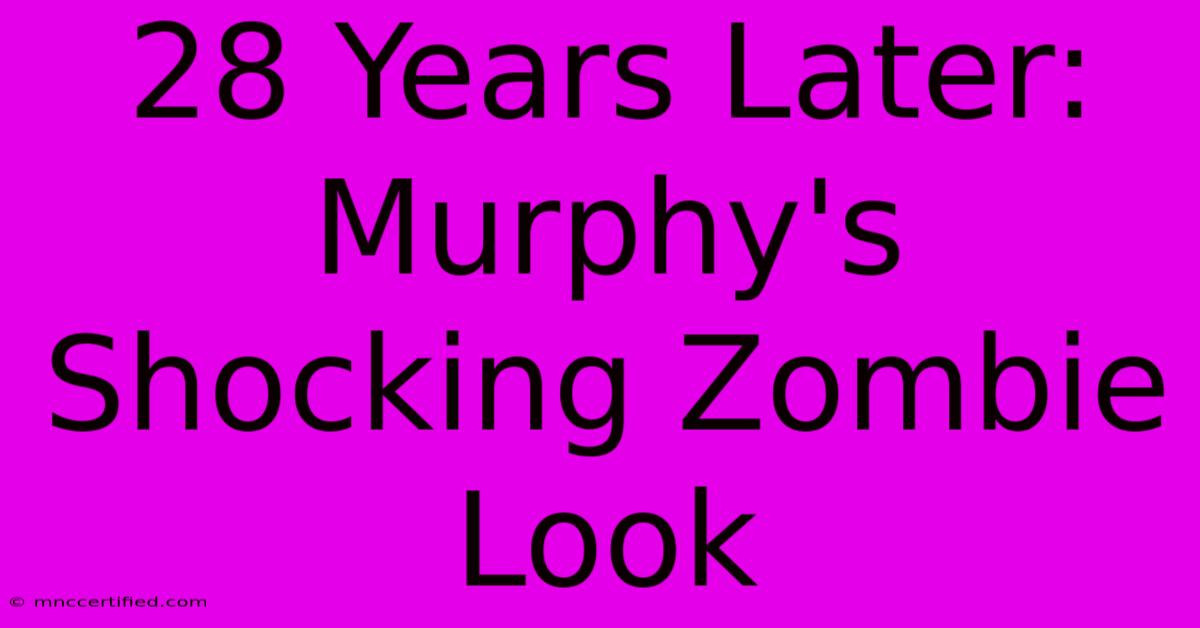28 Years Later: Murphy's Shocking Zombie Look

Table of Contents
28 Years Later: Murphy's Shocking Zombie Look – A Deep Dive into Makeup and Legacy
Twenty-eight years after its release, Danny Boyle's groundbreaking zombie film, 28 Days Later, continues to captivate audiences. While the film's fast-paced action, chilling atmosphere, and social commentary remain potent, one element stands out for its lasting impact: Cillian Murphy's shocking, realistic portrayal of a zombie. This article delves into the makeup artistry behind Murphy's transformation and explores the enduring legacy of his iconic look.
The Makeup Magic: Creating the "Rage" Zombie
The zombies in 28 Days Later are unlike any seen before. They're not slow, shambling creatures; they're ferocious, incredibly fast, and driven by primal rage. This necessitated a unique approach to makeup design. Instead of the classic decaying, rotting look, the film opted for a more visceral, realistic depiction of infection.
Key Elements of Murphy's Zombie Transformation:
-
Pale Skin & Sunken Eyes: The initial stages emphasized a gaunt, pale complexion, reflecting the character's physical deterioration and exhaustion. The sunken eyes contributed significantly to the look of desperation and intense hunger.
-
Blood Splatter & Bruising: Strategic blood splatter, expertly applied, hinted at the violence inherent in the zombie world, while subtle bruising added a layer of realism and suggested the aftermath of intense physical exertion.
-
Intense Eyes: While not overtly grotesque, the eyes played a crucial role. They conveyed a primal, animalistic aggression, adding to the unsettling nature of the character's transformation. The effect wasn't achieved solely through makeup but also through Murphy's powerful performance.
-
Subtlety Over Gore: The makeup team masterfully avoided excessive gore. The focus remained on the raw emotion and the underlying physical changes, enhancing the overall effect of terror and unease. This subtle approach arguably made Murphy's zombie transformation even more disturbing.
Beyond the Makeup: The Performance
Cillian Murphy's acting is inseparable from the success of his zombie portrayal. His physicality, his vacant stare, and his raw, animalistic movements perfectly complemented the makeup design, creating a truly unforgettable character. He wasn't just wearing zombie makeup; he was the zombie.
The Enduring Legacy of Murphy's Zombie Look
Murphy's zombie in 28 Days Later redefined the zombie genre in cinema. His look, a departure from traditional zombie aesthetics, became a benchmark for subsequent zombie films, influencing the portrayal of infected characters in countless other movies and television shows. It’s a testament to the power of effective makeup and compelling performance. The look also sparked discussions about realism in horror makeup and the evolution of the zombie archetype.
Impact on the Zombie Genre:
- Speed and Aggression: 28 Days Later’s fast, aggressive zombies directly challenged the classic slow-moving zombie trope, significantly influencing future zombie narratives.
- Realistic Depiction: The film's focus on a realistic depiction of infection, as opposed to exaggerated gore, resonated deeply with audiences and critics, shifting the landscape of zombie cinema.
- Psychological Horror: The film's portrayal of the infected, including Murphy's character, emphasized the psychological horror of the situation, adding another dimension to the genre.
Conclusion: A Landmark Moment in Zombie History
Twenty-eight years on, Cillian Murphy's zombie transformation in 28 Days Later remains a powerful testament to the art of makeup, acting, and the enduring power of cinematic innovation. His character's shocking appearance continues to be discussed, analyzed, and imitated, securing his place in zombie movie history and shaping the genre for decades to come. The subtle yet impactful makeup, combined with Murphy’s compelling performance, cemented the film’s lasting legacy in horror cinema.

Thank you for visiting our website wich cover about 28 Years Later: Murphy's Shocking Zombie Look. We hope the information provided has been useful to you. Feel free to contact us if you have any questions or need further assistance. See you next time and dont miss to bookmark.
Featured Posts
-
Managerless Northamptons Peterborough Clash
Dec 10, 2024
-
Forth Insurance Monroe La
Dec 10, 2024
-
Ralph Fiennes Fights Zombies Trailer
Dec 10, 2024
-
Lawsuit Targets Jay Z Child Rape Claim
Dec 10, 2024
-
Chase Bengals Top Cowboys After Fumble
Dec 10, 2024